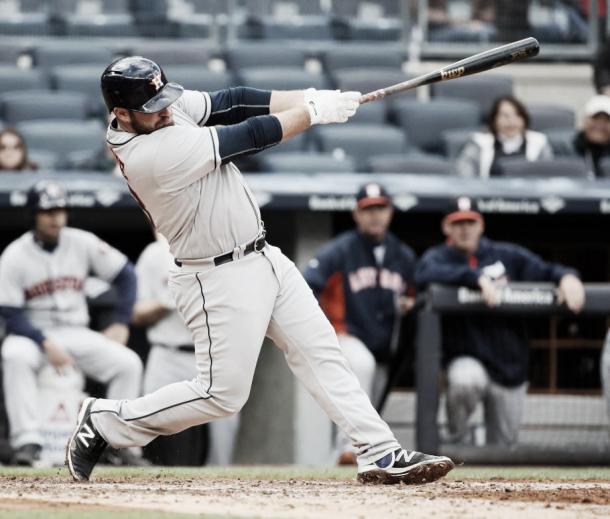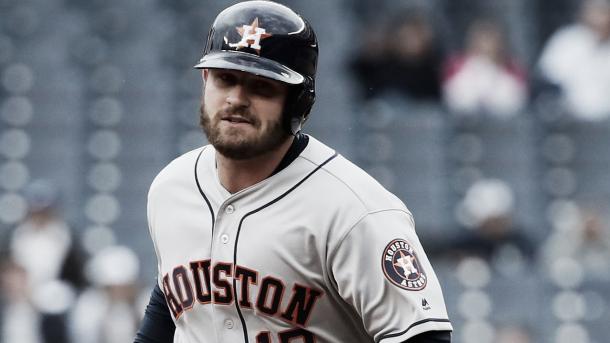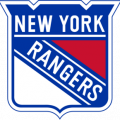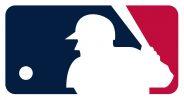The first week of the 2016 Major League Baseball season has come and gone and already fans are presented with numerous storylines. The Colorado Rockies' breakout rookie Trevor Story has taken the league by storm by hitting seven home runs in his first six games. Another rookie proving his worth early on wasn't even a lock for the Opening Day roster. Now, he and Story have made history by becoming the first rookie duo to earn American League and National League Player of the Week honors.
Houston Astros' first baseman Tyler White is another young face that has many fans and analyst begging the question, "who is this guy?" While going 12-for-22 though his first six career games with three home runs and nine runs batted in, White has emerged as possibly the next everyday first baseman for Houston after years of searching to fill the void.
"People refer to this as the 'Tyler White experiment." Astros general manager Jeff Luhnow says. "Well, it worked in college. It worked at seven levels of the minor leagues. We fully expect it to work at the major-league level."
White's Unlikely Road to the Show
White's story to the Majors is not what you would expect from the starter of a widely-predicted World Series caliber team. He walked-on at Western Carolina due to receiving no offers from Div. I programs. White was the 977th player drafted in the 2013 draft and qualified for just a $1,000 signing bonus. It was his girlfriend who texted him he had been drafted, as he gave up on checking his phone while out helping his father coach an AAU baseball team.
In all fairness, it's wasn't outrageous for White to be a little pessimistic. He only spoke to one MLB scout while in college, someone who he had known from his hometown in Mooresboro, North Carolina, who worked for the San Francisco Giants. In fact, it was the the Astros and one other team who showed interest in the 22-year old, while the other 28 teams deemed White unfit for MLB service.

But White wanted to play professional baseball. No matter what level. He didn't want to have to call it quits just as his hitting ability seemed to be at an all-time high. He posted a solid batting average over four years at Western Carolina, but it was his power numbers that started reaching MLB potential. White hit six home runs in his first three years, he hit 16 his senior year.
"I'm telling scouts, 'You don't understand, this guy can flat-out rake," Bobby Moranda, White's head coach at Western Carolina, said. "You know what a guy who can really hit looks like. Every time we faced these (future) draft picks, he raked those guys. He was hitting and hitting for power."
The Astros drafted White with the unlikely hope that he could become a quality bat off the pine. But White quickly proved he had real MLB talent and could hit with the best of them, but it wouldn't be easy. White already had to make the transition from third to first base due to his body composition. At 5-foot-11, 225 lbs., White wasn't considered a prototypical MLB third baseman. In fact, he had to fight every at bat just to crack the starting lineup when he first played for the Astros rookie and single-A ball clubs.
"In college, you played to win. You didn't really think about that kind of stuff," White said. "It's hard to find the middle ground. Last year I came in light. I don't think I was as strong as I should have been. This year, I'm kind of in the middle. I'm still trying to work on it. It takes a long time to put on muscle and lose fat."
White quickly found his rhythm and turned into one of the best hitters in minor league baseball. In 2015, he batted .325 with 14 home runs and 99 RBI in 495 at-bats last season, splitting his time between Class AA Corpus Christi and Class AAA Fresno. He received an invitation to Spring Training where he would compete with Jon Singleton, another Astros' draft pick who they hoped would eventually pan out, and second round draft pick 22-year old A.J. Reed. Reed was believed by many to be the top prospect at first base in all of baseball and while he'll get his number called sooner rather than later, it still would be a close call between Reed and White.
Like he had always done, White would hit his way into the public and organization's consideration.
Getting the Call
After posting a .353 average in the spring and blasting three home runs, 12 RBIs, nine walks and a .443 OBP in 51 at bats, White quickly went from long-shot, to likely Opening Day roster. He gained not only respect by his teammates, but news outlets around the country began predicting White as the new starting first baseman for the Astros.
The announcement officially came on April 1, but it would be no joking matter or prank. White was informed he made the 25-man roster and finally reached his dream. He got his first major league hit on a 1-2 changeup from Chasen Shreve into center field, becoming the first Astros player to record his first major-league hit on opening day since James Mouton in 1994. He would reach base in his second plate attempt on a hit by pitch, continuing to do what he does best: get on base.
White would have to wait until the second game of the season to hear his name called out in the first inning.
"It's a great feeling," White said. "It's what I've been working toward my whole life and it's a dream come true. It's awesome."
White, after going nearly undrafted, working his way up through minor league, and proving he could hit on all levels of competition, was named the Astros starting first baseman in his second MLB game. White took advantage of the at bats, going 2-for-4 with a double off of New York Yankees' Michael Pineda, a pitcher he had seen during Spring Training.

Through just seven games, White leads the Astros in batting average (.545), hits (12), doubles (3), home runs (3), RBI (9), OBP (.577) and slugging percentage (1.091). He has also continued to climb the batting order for Astros' manager A.J. Hinch, hitting in the eight-hole and then moving up to the sixth and now the fifth spot for the Astros.
With Reed continuing to grow and improve in the minors and if White keeps up this pace, the Astros will be presented with a very difficult decision as to who should start at first.
"Tyler White will be an everyday, big-league first baseman. We might end up having two or three of those guys," Luhnow said. "But right now, Tyler White is the best choice in our organization. He's not a place-holder for anyone except himself. We're going to give him every chance to succeed."










































